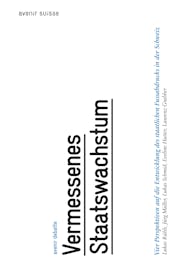The footprint of government in Switzerland has grown significantly in recent decades. The fiscal quota – including compulsory contributions to health and pension funds – is 40%, roughly on a par with Germany and Austria.
The public sector employs 950,000 people (in full-time equivalent terms) or 23% of Switzerland’s total labor force. At 13%, the public sector workforce has grown significantly faster over the past ten years than employment in the private sector (8%).
Even though Switzerland is seen as a highly competitive place to do business by international standards, the country has a high density of regulation. The more specifically an index measures regulatory density, the worse Switzerland performs in an international comparison. Not only that, but more than half of prices in this country are no longer the result of supply and demand, but are significantly influenced or even directly controlled by government.
Government influence is also increasing in privately organized areas of society by way of subsidies and privileges. Temporary measures often turn into permanent “fixer” roles and politicians are constantly expanding their range of authority. Public funding to the tourism industry, for example, has more than tripled within 30 years, adjusted for inflation.
Even though Swiss government is generally considered lean, the present analysis by Avenir Suisse shows that its sphere of influence is now large and continues to grow. This is critical in a country without natural resources whose prosperity is based on a dynamic and innovative economy reliant on bottom-up processes and the proximity of politicians and political institutions to the people.
Recommendations for Action
There are many recipes for keeping government growth in check. Of key importance are the brakes on federal and cantonal debt; any easing of these should be avoided. The only area where changes are needed is in the way crisis debts are handled at the federal level: after future crises it should be permitted to offset any debts accumulated through extraordinary expenditure against past surpluses (if any are available).
Some of the proposals discussed in this study have already been repeatedly called for in public – such as a referendum on finances at the federal level, increasing the transparency of regulatory impact assessments and having them reviewed by an independent commission of part-time politicians, applying a “one-in, one-out” rule for regulations, and systematically recording and publishing all subsidies and grants on a centralized basis. In addition to these prescriptions, however, new approaches are presented that should find their way from this publication into the public debate:
- Applying the idea of part-time (“Miliz”) political service to administrative careers: Jobs in administration should only be filled by people who have worked outside the public sector for a minimum number of years. This kind of “apprenticeship” in the private sector would improve government’s understanding of how organizations outside the public sector function and make it easier for employees in the administration to move back into the private sector.
- Benchmarking pay: Pay benchmarking could be implemented in areas with strong competition for workers. This would involve calculating an average for private sector terms of employment for certain functions and setting it as an upper limit for public sector terms of employment.
- Introducing a “spring clean”: To make politicians more aware that legislating is a matter not just of what you add but also of what you leave out, a kind of “spring clean” should be instituted. Parliament should devote a certain amount of time, for example one special session per year, exclusively to identifying and deleting obsolete, misguided or over-expensive provisions.









